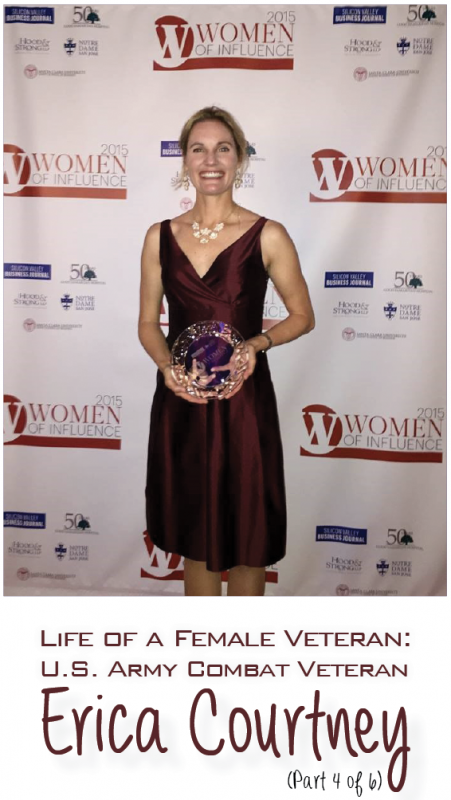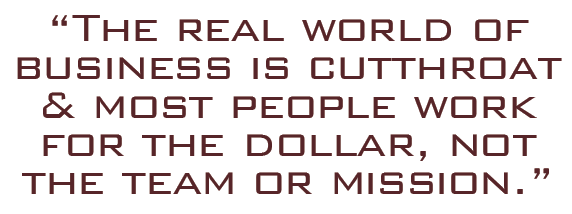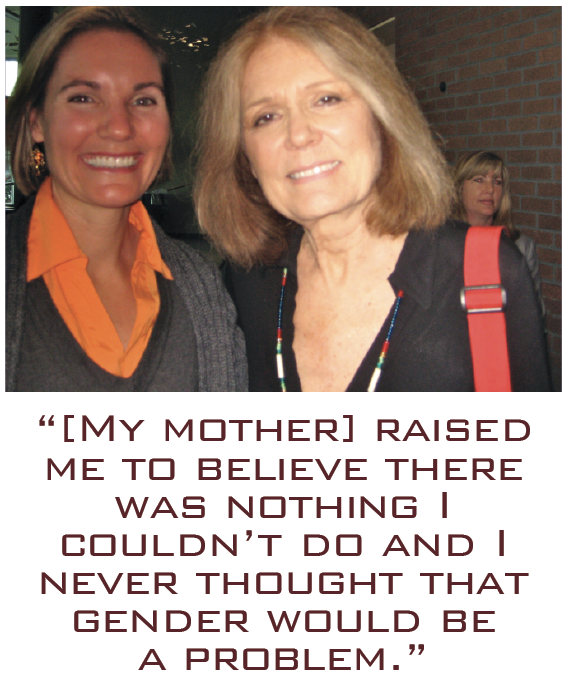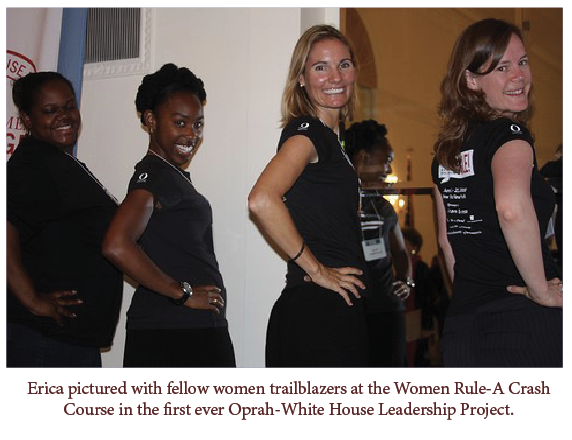 With my EMBA close to completion, I was offered a senior level job at a logistics company in Miami. They needed me to lead and grow the government market. Even though I kicked and screamed about being pigeon-holed in logistics and contracting, it sure was a marketable skill. I used to buy everything, from BBQs and sunglasses to furniture and aircraft armor. I worked with the contracting officers and comptrollers who handle the big budgets routinely when I had to equip my units in the U.S. or abroad. Now companies wanted to know how to get to the person I used to be.
With my EMBA close to completion, I was offered a senior level job at a logistics company in Miami. They needed me to lead and grow the government market. Even though I kicked and screamed about being pigeon-holed in logistics and contracting, it sure was a marketable skill. I used to buy everything, from BBQs and sunglasses to furniture and aircraft armor. I worked with the contracting officers and comptrollers who handle the big budgets routinely when I had to equip my units in the U.S. or abroad. Now companies wanted to know how to get to the person I used to be.
It was obvious people had no clue how to deal with federal buyers. I could build a section and plan out their approach. Sure, sign me up. I will take the job. For the first time, I had to think about what I was going to wear. It had been uniforms day in and day out forever. Not a big shopper, I found outfits on mannequins that looked good and showed up early, because if you are not early in the Army you are late.
No one was there when I got there. The boss pulled up, happy to see me and said I was looking sharp. I thought nothing of it. I had to be very guarded; you never give off signals in the Army. My boundaries were disciplined. In Miami, flirtatiousness abounded. I wanted to be taken seriously and flirting would have destroyed that. I worked hard and the boss loved me, but I was in my own bubble. No one knew what I was doing or had any idea about government. I was not connecting with the workers. It was not a good fit.
I left after a year. Corporate America was not my thing. However, during this time, Oprah and The White House Project named me, along with 50 other women around the country, a woman with the background and drive to change the world. We were all sponsored and flown to New York to collaborate with community, government and private leaders who inspired me to continue to serve.
Degree in hand, I decided to go it alone. My family was now moving to Jacksonville, Florida. The need for government business development was there. I researched the market and found many unqualified people charging a fortune to break into this space. People just don’t know what they don’t know. You can’t just jump in. You have to understand the buyer’s language. I knew within 30 seconds if I would work with a vendor or not while serving. Why not prepare people correctly, especially if they were willing to pay for my expertise?
I formed an LLC and began getting out there speaking at local chambers of commerce, business events and similar engagements. I started forming connections that led to leads and secured my first contract within two months of starting my company with a solar thermal manufacturer. They were a great client and I connected with my contact who was a “tell it like it is gal” who was right up my alley. As in battle, you need to know your conditions; who is to your left and right, enemies, communications and more. In business, it is imperative to know your competition, who is buying, what their messaging is and how to speak in a way that resonates with the buyer. I took my military skills of analysis, planning and problem-solving and applied them to my work on the outside. I began to get more clients and before I knew it, I was making over $300,000 in revenue.
 Seasoned, experienced people at venture capital firms and billion-dollar companies said that I produced the best sales and marketing plans they had seen in their careers. Yes, I earned an EMBA and it helped me with understanding that language, but it was my military strategic planning skills that earned me praise. I began hiring people and brought in a partner. I saw potential in this partner, but she had little experience in the contracting space at this level so I did what I knew best: I mentored and developed her over a year.
Seasoned, experienced people at venture capital firms and billion-dollar companies said that I produced the best sales and marketing plans they had seen in their careers. Yes, I earned an EMBA and it helped me with understanding that language, but it was my military strategic planning skills that earned me praise. I began hiring people and brought in a partner. I saw potential in this partner, but she had little experience in the contracting space at this level so I did what I knew best: I mentored and developed her over a year.
I would put her in front of the customer without getting involved except to guide her from the sidelines. This turned out to be a mistake. I trusted her as I trusted my military brethren. She got greedy, wanted her own business and took the clients because all they knew was her. It was a lesson that taught me greed trumps loyalty and to never expect thanks for training someone and introducing them to a skill that provides them a livelihood.
It turns out that when she came to me demanding 50 percent of the company and was turned down, she had already been moving company documents electronically for over a month. She was taking proprietary information to create her own business. Lawyers got involved and from that, I came out on top and my former partner had to pay all legal fees. It was painful, not necessarily the monetary part of it, but the realization that people do not behave as you think they should. If I was brought in, trained, paid more than the founder and given the opportunity to be the front man not being micromanaged, I would have been grateful.
They say in business you actually earn your tuition by doing, not in school. The real world of business is cutthroat and most people work for the dollar, not the team or mission. I wondered over and over, could I have seen the signs? What did I do wrong? How could I have smoothed this over? How could I learn from this? It baffled me. I did not see this coming and was given no warning about my partner’s intentions. Bottom line, I chalked it up to a learning lesson never to be repeated. I became much wearier from that time on.
 Despite this setback, I was named one of the top 40 people in the community under 40 doing well in business by the Jacksonville Business Journal. I started getting involved in advocacy. It is known that veterans are much more likely to continue service upon their release. I became a Commissioner for Jacksonville representing more than 650,000 women. Every month, community representatives would come in and discuss their specific issues such as young girls and women in the judicial system, healthcare discrepancies, and transportation issues for mothers working two or three jobs through the evening hours, women of color bias, employment and more.
Despite this setback, I was named one of the top 40 people in the community under 40 doing well in business by the Jacksonville Business Journal. I started getting involved in advocacy. It is known that veterans are much more likely to continue service upon their release. I became a Commissioner for Jacksonville representing more than 650,000 women. Every month, community representatives would come in and discuss their specific issues such as young girls and women in the judicial system, healthcare discrepancies, and transportation issues for mothers working two or three jobs through the evening hours, women of color bias, employment and more.
I never thought about a lot of this, I never had to. Having been a woman in a “man’s world,” I thought I understood discrimination and biased behavior. However, I realized I had a lot to learn from the women before me. As the youngest on the panel of seasoned women, the President had mentioned that Gloria Steinem was coming to visit us and all the women were excited. I, never afraid to admit I don’t know something, cautiously asked, “Who is Gloria Steinem?” Boy, the looks those women gave me were like knives cutting through butter. They explained that she had been a pioneer of women’s rights since the 1960s.
I went home and figured if anyone would know her, my mother would. My mother joined the Peace Corps when I was 18 and had always been fighting for causes. She raised me to believe there was nothing I couldn’t do and I never thought that gender would be a problem. My mother said, “Of course I know her. You marched on my back when you were a baby with her several times fighting for women’s rights.” It was at that moment that I realized I needed to know the women who came before me. Why didn’t I know my own gender history? I started paying attention. Even though I was blazing trails, there were many before me that made it possible for me to do what I did.
After five years of successful growth, I decided to keep only my favorite clients and move on to another venture. The next move was northern California. A former client of mine was very connected and respected in the Silicon Valley area. She approached me and asked if I would want to go into business with her. I did my risk analysis I had been so trained to do. Already a very successful business owner, check. Can teach me a few things, check. Is giving me the opportunity to get business through her contacts given that I am already a certified veteran-owned firm in California, check. In the field of logistics which I understand well, check. Data capture through smart people and equipment like drones, check.
 It was a different kind of business. Not consulting per se, but the actual management of “stuff.” I had to start getting out there and meeting people in a way I did not have to before. There was much focus on sales, marketing and connections. Based on my work in business and the community, the Silicon Business Journal named me a Women of Influence. Like many veterans, I researched many groups on the internet that could help guide me along. There were plenty of veteran advocacy groups, many popping up every day. It is no wonder veterans isolate themselves; it is very confusing to know who to sift through. Who is credible? Where are they, thousands of miles away? Most groups centered on handouts, employment, mental health, adaptive construction for disabilities and everything VA. I was not interested in those. I was looking for peer groups in business, a grassroots approach and something I could belong to locally, not in D.C.
It was a different kind of business. Not consulting per se, but the actual management of “stuff.” I had to start getting out there and meeting people in a way I did not have to before. There was much focus on sales, marketing and connections. Based on my work in business and the community, the Silicon Business Journal named me a Women of Influence. Like many veterans, I researched many groups on the internet that could help guide me along. There were plenty of veteran advocacy groups, many popping up every day. It is no wonder veterans isolate themselves; it is very confusing to know who to sift through. Who is credible? Where are they, thousands of miles away? Most groups centered on handouts, employment, mental health, adaptive construction for disabilities and everything VA. I was not interested in those. I was looking for peer groups in business, a grassroots approach and something I could belong to locally, not in D.C.
Erica Courtney
CEO of 2020vet and
U.S. Army Combat Veteran

 Login
Login
